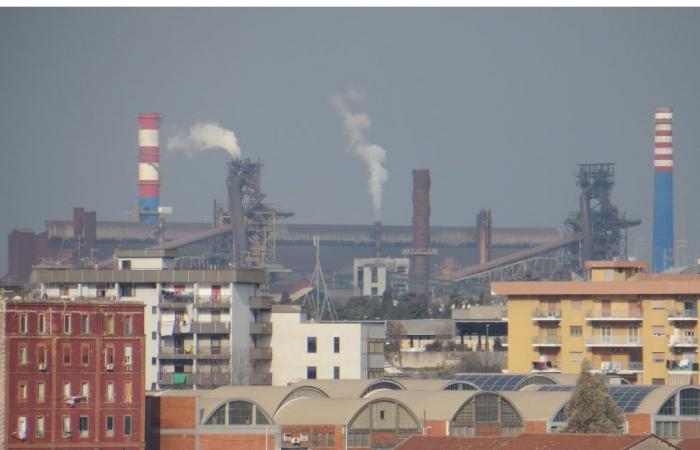The Ilva steelworks in Taranto began its activities in 1965, has around 11,000 employees and covers an area of around 1,500 hectares, and is one of the largest steelworks in Europe.
In 2019 the European Court of Human Rights found that the steelworks caused significant harmful effects on the environment and on the health of the inhabitants of the area and the Court of Justice of the European Union recalls that «There are assessments of health damage drawn up in years 2017, 2018 and 2021 which attest to a causal relationship between the altered state of health of residents in the Taranto area and the emissions from the Ilva steelworks, especially with reference to PM10 fine particles and sulfur dioxide (SO2) of origin industrial. Other pollutants related to the steelworks activity were detected, such as copper, mercury and naphthalene, as well as PM2.5 and PM10 fine particles. In a January 2022 report by the United Nations Human Rights Council, Taranto was included among the “sacrifice zones”. These are areas characterized by extreme levels of pollution and contamination by toxic substances in which vulnerable and marginalized populations suffer the consequences of exposure to pollution and dangerous substances on health, human rights and the environment much more than others. ».
Various measures to reduce Ilva’s impact have been envisaged since 2012, but the deadlines established for their implementation have been repeatedly postponed.
Numerous citizens of Taranto have taken legal action before the Court of Milan against the continuation of the operation of the steelworks, claiming that its emissions are harmful to their health and that the installation does not comply with the requirements of the industrial emissions directive approved in 2010 .
The Court of Milan asked the EU Court of Justice whether the Italian legislation and the special derogating rules applicable to the Ilva steelworks in order to guarantee its continuity are in conflict with the directive.
The reference for a preliminary ruling allows the judges of the Member States, in the context of a dispute before them, to consult the Court regarding the interpretation of Union law or the validity of a Union act. The Court does not resolve the national dispute. It is up to the national judge to resolve the case in accordance with the Court’s decision. This decision is equally binding on other national judges to whom a similar problem is referred.
In its ruling the EU Court first of all underlines «The close connection between the protection of the environment and that of human health, which constitute key objectives of Union law, guaranteed in the Charter of Fundamental Rights of the European Union. It notes that the Directive contributes to the achievement of those objectives and to safeguarding the right to live in an environment capable of ensuring health and well-being.’
While, according to the Italian Government, the Directive makes no reference to the assessment of health damage, the Court notes that « The notion of “pollution” within the meaning of the Industrial Emissions Directive includes damage to the environment and human health. The prior assessment of the impact of the activity of an installation such as the Ilva steelworks in southern Italy must therefore constitute an internal act in the procedures for issuing and reviewing the operating authorization provided for by this directive. In the review procedure it is necessary to consider the pollutants connected to the installation’s activity, even if they were not evaluated in the initial authorization procedure. In case of serious and relevant dangers to the integrity of the environment and human health, the operation of the installation must be suspended.”
The Court points out that «Therefore, the assessment of the impact of the activity of an installation such as the Ilva steelworks on these two aspects must constitute an internal act in the procedures for issuing and reviewing the operating authorization. However, according to the Court of Milan, this requirement was not respected with regards to health damage. The manager must also evaluate these impacts throughout the entire operating period of his installation. Furthermore, according to the Court of Milan, the special rules applicable to the Ilva steelworks allowed it to issue an environmental authorization and to review it without considering certain polluting substances or their harmful effects on the surrounding population”.
The EU Court of Justice notes that «The operator of an installation must provide, in his application for initial authorisation, information relating to the type, extent and potential negative effect of the emissions that may be produced by his installation. Only polluting substances that are considered to have a negligible effect on human health and the environment may not be subject to compliance with the emission limit values in the operating authorization”.
For the Court, «Contrary to what was claimed by Ilva and the Italian government, the review procedure cannot be limited to setting limit values for polluting substances whose emission was foreseeable. It is also necessary to take into account the emissions actually generated by the installation during its operation and relating to other polluting substances. In case of violation of the conditions of authorization to operate the installation, the operator must immediately take the necessary measures to ensure the restoration of compliance of his installation with these conditions in the shortest possible time. In the event of serious and relevant dangers to the integrity of the environment and human health, the deadline for applying the protection measures provided for in the operating authorization cannot be repeatedly extended and the operation of the installation must be suspended.” .
Legambiente Taranto’s comment is clear: «EU Court ruling: former Ilva plant must be suspended if it “presents serious and relevant dangers for the environment and human health”. The preventive Health Impact Assessment is mandatory, which we have been asking for – unheeded – for over 10 years: evidently we were right”






